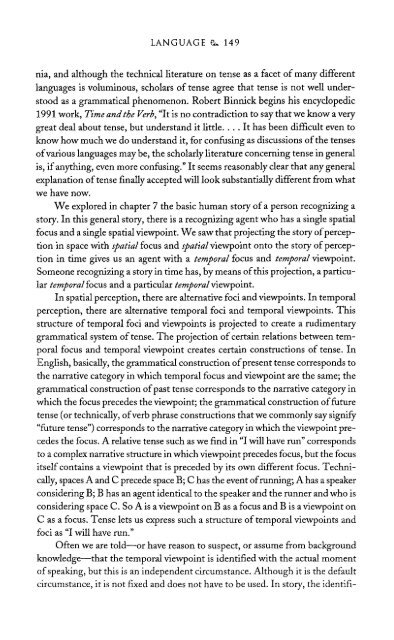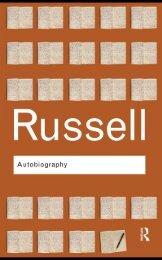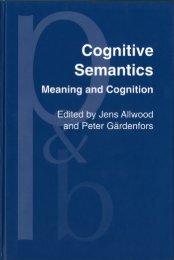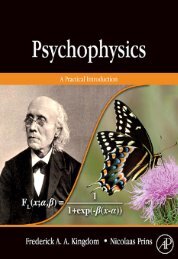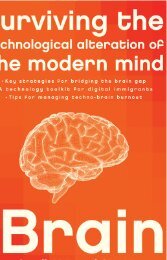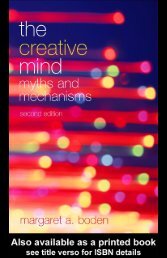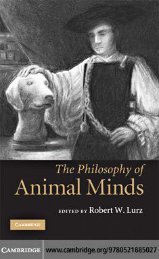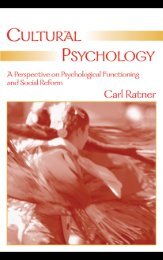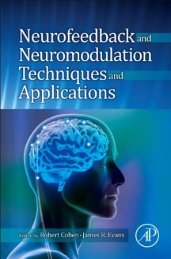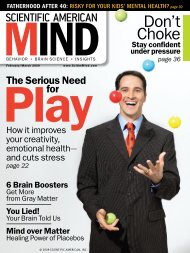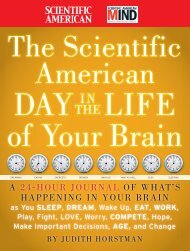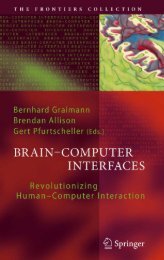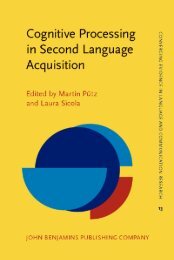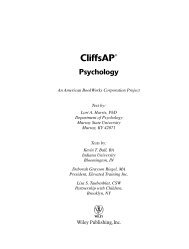The Literary Mind.pdf
The Literary Mind.pdf
The Literary Mind.pdf
Create successful ePaper yourself
Turn your PDF publications into a flip-book with our unique Google optimized e-Paper software.
LANGUAGE 149<br />
nia, and although the technical literature on tense as a facet of many different<br />
languages is voluminous, scholars of tense agree that tense is not well understood<br />
as a grammatical phenomenon. Robert Binnick begins his encyclopedic<br />
1991 work, Time and the Verb, "It is no contradiction to say that we know a very<br />
great deal about tense, but understand it little. ... It has been difficult even to<br />
know how much we do understand it, for confusing as discussions of the tenses<br />
of various languages may be, the scholarly literature concerning tense in general<br />
is, if anything, even more confusing." It seems reasonably clear that any general<br />
explanation of tense finally accepted will look substantially different from what<br />
we have now.<br />
We explored in chapter 7 the basic human story of a person recognizing a<br />
story. In this general story, there is a recognizing agent who has a single spatial<br />
focus and a single spatial viewpoint. We saw that projecting the story of perception<br />
in space with spatial focus and spatial viewpoint onto the story of perception<br />
in time gives us an agent with a temporal focus and temporal viewpoint.<br />
Someone recognizing a story in time has, by means of this projection, a particular<br />
temporal focus and a particular temporal viewpoint.<br />
In spatial perception, there are alternative foci and viewpoints. In temporal<br />
perception, there are alternative temporal foci and temporal viewpoints. This<br />
structure of temporal foci and viewpoints is projected to create a rudimentary<br />
grammatical system of tense. <strong>The</strong> projection of certain relations between temporal<br />
focus and temporal viewpoint creates certain constructions of tense. In<br />
English, basically, the grammatical construction of present tense corresponds to<br />
the narrative category in which temporal focus and viewpoint are the same; the<br />
grammatical construction of past tense corresponds to the narrative category in<br />
which the focus precedes the viewpoint; the grammatical construction of future<br />
tense (or technically, of verb phrase constructions that we commonly say signify<br />
"future tense") corresponds to the narrative category in which the viewpoint precedes<br />
the focus. A relative tense such as we find in "I will have run" corresponds<br />
to a complex narrative structure in which viewpoint precedes focus, but the focus<br />
itself contains a viewpoint that is preceded by its own different focus. Technically,<br />
spaces A and C precede space B; C has the event of running; A has a speaker<br />
considering B; B has an agent identical to the speaker and the runner and who is<br />
considering space C. So A is a viewpoint on B as a focus and B is a viewpoint on<br />
C as a focus. Tense lets us express such a structure of temporal viewpoints and<br />
foci as "I will have run."<br />
Often we are told—or have reason to suspect, or assume from background<br />
knowledge—that the temporal viewpoint is identified with the actual moment<br />
of speaking, but this is an independent circumstance. Although it is the default<br />
circumstance, it is not fixed and does not have to be used. In story, the identifi-


